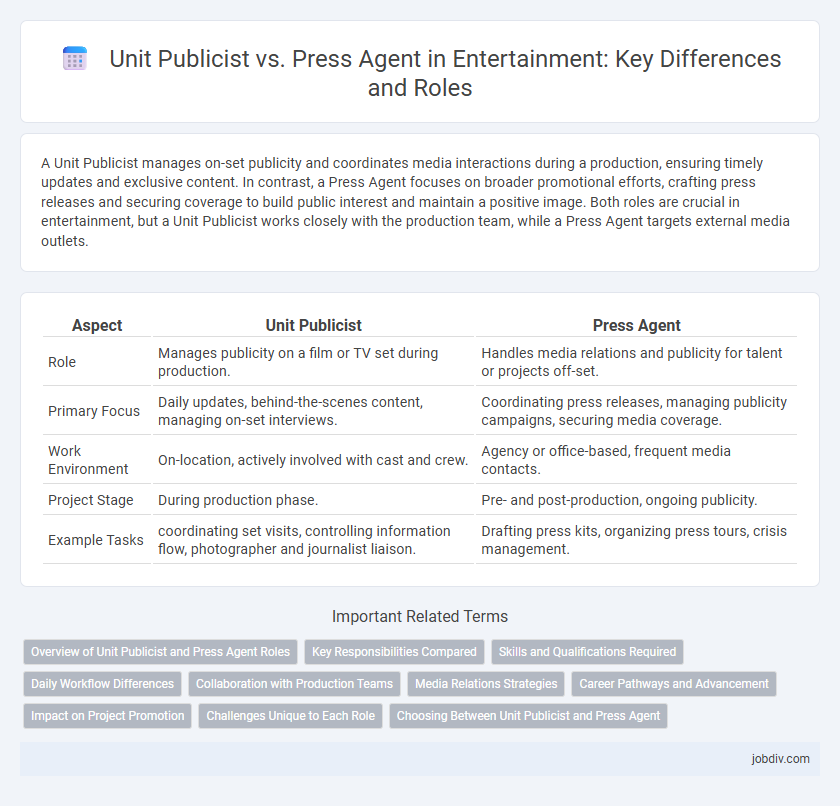A Unit Publicist manages on-set publicity and coordinates media interactions during a production, ensuring timely updates and exclusive content. In contrast, a Press Agent focuses on broader promotional efforts, crafting press releases and securing coverage to build public interest and maintain a positive image. Both roles are crucial in entertainment, but a Unit Publicist works closely with the production team, while a Press Agent targets external media outlets.
Table of Comparison
| Aspect | Unit Publicist | Press Agent |
|---|---|---|
| Role | Manages publicity on a film or TV set during production. | Handles media relations and publicity for talent or projects off-set. |
| Primary Focus | Daily updates, behind-the-scenes content, managing on-set interviews. | Coordinating press releases, managing publicity campaigns, securing media coverage. |
| Work Environment | On-location, actively involved with cast and crew. | Agency or office-based, frequent media contacts. |
| Project Stage | During production phase. | Pre- and post-production, ongoing publicity. |
| Example Tasks | coordinating set visits, controlling information flow, photographer and journalist liaison. | Drafting press kits, organizing press tours, crisis management. |
Overview of Unit Publicist and Press Agent Roles
Unit publicists coordinate on-set publicity efforts, managing media access and promoting film production milestones to generate buzz during filming. Press agents specialize in securing press coverage, arranging interviews, and crafting press releases to enhance the public profile of entertainment projects or personalities. Both roles are essential in shaping a project's media narrative but operate at different stages and with distinct tactical approaches.
Key Responsibilities Compared
A Unit Publicist primarily handles on-set media relations, coordinating interviews and photo opportunities during production to ensure positive coverage while maintaining the project's schedule. A Press Agent focuses on managing the publicity and promotional campaigns pre- and post-release, crafting press releases and organizing events to maximize audience engagement. Both roles require strong communication skills but differ in timing and scope of media interaction.
Skills and Qualifications Required
Unit publicists require strong organizational and communication skills to coordinate media activities on set while managing daily publicity needs. Press agents must excel in strategic media relations, crisis management, and persuasive communication to build and maintain a positive public image for clients or projects. Both roles demand expertise in social media, networking, and an in-depth understanding of the entertainment industry's dynamics.
Daily Workflow Differences
Unit publicists manage on-set publicity by coordinating interviews, photoshoots, and social media updates to maintain daily buzz during production. Press agents focus on broader media relations, pitching stories to outlets, arranging press tours, and preparing press releases to maximize film or project visibility. The unit publicist's workflow is hands-on and immediate, while the press agent's tasks are strategic and long-term.
Collaboration with Production Teams
Unit publicists collaborate closely with production teams on set to manage real-time media coverage and control the narrative during filming. Press agents work primarily with marketing departments to coordinate publicity strategies and distribute press materials across various platforms. Their combined efforts ensure cohesive communication between the production and external media, enhancing the project's visibility and public engagement.
Media Relations Strategies
Unit publicists specialize in managing on-set publicity and coordinating media access during film or television production, ensuring real-time media coverage and exclusive content. Press agents focus on long-term media relations, crafting press releases, organizing interviews, and maintaining ongoing relationships with journalists to sustain public interest. Both roles utilize tailored media relations strategies to maximize exposure, with unit publicists emphasizing immediate buzz and press agents fostering sustained publicity.
Career Pathways and Advancement
A Unit Publicist typically works on-set during film or television production, managing daily media relations and promoting the project to generate buzz, which can lead to staged roles in larger productions or studio publicity departments. Press Agents often operate outside the set, handling broader publicity campaigns and client image management for actors or directors, allowing career advancement into senior PR roles or agency leadership. Both career pathways demand strong communication skills and industry networking, with growth often achieved through experience on high-profile projects and building a robust portfolio of media successes.
Impact on Project Promotion
A Unit Publicist manages on-set publicity, offering real-time updates and exclusive content that enhances audience engagement during production. A Press Agent focuses on broader media relations and orchestrating press coverage to generate widespread buzz ahead of and after a project's release. The combined efforts of both roles maximize project visibility and drive successful promotional campaigns.
Challenges Unique to Each Role
Unit publicists face challenges coordinating real-time communication on set, managing cast and crew availability, and controlling sensitive information during production. Press agents deal with the ongoing task of maintaining media relationships, crafting compelling stories to promote clients, and handling public reactions in a rapidly changing news cycle. Each role requires specialized skills to navigate the distinct pressures of production logistics versus external media engagement.
Choosing Between Unit Publicist and Press Agent
Choosing between a Unit Publicist and a Press Agent depends on the specific needs of the entertainment project; Unit Publicists focus on promoting films or TV shows during production, handling on-set publicity and exclusive content, while Press Agents manage broader media relations and campaign strategies post-production. Budget constraints and target audience engagement play crucial roles in this decision, as Unit Publicists often provide more specialized, production-centric visibility compared to the wide-reaching media campaigns orchestrated by Press Agents. Evaluating the project's timeline, promotional goals, and desired media exposure ensures selecting the most effective professional to maximize public interest and industry buzz.
Unit Publicist vs Press Agent Infographic

 jobdiv.com
jobdiv.com